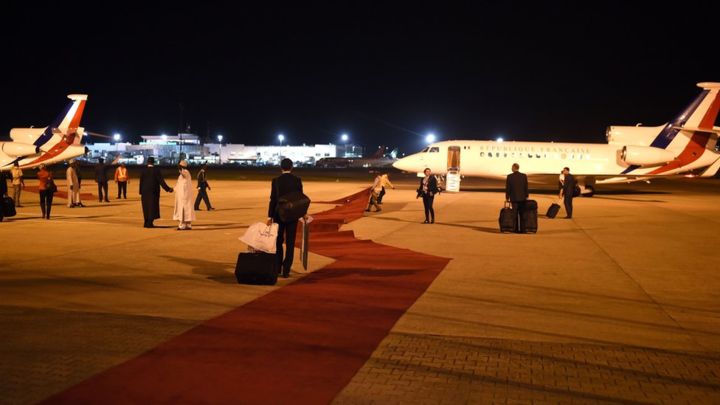- No Going Back on Airports’ Concession, Says FG
The Federal Government says the planned concession of major airports across the country will go ahead as planned.
This is just as it announced that N45bn would be paid to ex-workers of the defunct Nigerian Airways as severance package.
The Minister of State for Aviation, Hadi Sirika, stated this while fielding questions from State House correspondents after the Federal Executive Council meeting at the Presidential Villa, Abuja, on Wednesday.
He was reacting to the protests by members of the Air Transport Service Senior Staff Association and the National Union of Air Transport Employees, who kicked against the planned concession.
Sirika said the government could no longer sustain the funding of the 22 airports across the country and thus had to enter into concession arrangements.
The minister said the Murtala Muhammed International Airport in Lagos, for instance, was originally built to handle 200,000 travellers per annum but today, it was serving eight million passengers per annum, stressing that the government did not have the resources to upgrade the facilities to handle the increasing number of travellers.
While acknowledging the rights of the workers to protest, Sirika said the government would try its best to ensure that jobs were not lost.
“At the time the concession of some government assets started, we were not knowledgeable in what concession entails; but today, we have the knowledge and it will be transparently done with the active participation of workers in both the delivery and the steering committees to drive this process,” he explained.
Sirika added that a portal would be created by the Infrastructure Concession Regulatory Commission where all matters of concession would be made available to ensure transparency.
He added, “I have to say that we have been meeting with them, but the policy of the government is that we cannot fund aviation infrastructure today through public budgets. The money is not there. We intend to get the private sector to come and put in their money.
“The policy has been done that it will go through concession, to give to some individuals who will build, operate, maintain, sustain and make money, and the government will also make money in the process and the airports will be returned to the government after a number of years, between 20 and 25 years. This will be transparently done; this is the catch phrase, so we are proceeding.”
He revealed that President Muhammadu Buhari had approved the concession of the airports since 2015, but things were being put in place to ensure that it was a success.
“Mr. President gave the approval for the concession of all Nigerian airports but to start with the big four in Lagos, Abuja, Kano and Port Harcourt. And that approval was taken to council and it also approved Lagos, Abuja, Port Harcourt and Kano to start with. The rest will follow in due course,” the minister said.
Sirika also told journalists that Buhari had approved N45bn as severance package for ex-workers of the Nigeria Airways, which was liquidated in 2003.
He added, “Past governments decided to liquidate the Nigeria Airways without attending to the issue of the entitlement of the workers and the workers had been struggling to get paid.”
“This government decided to take it seriously. And I am happy to announce that Mr. President has approved N45bn, which has been confirmed to be the entitlements of these workers, and the Ministry of Finance has been instructed to pay.
“The Ministry of Finance has written to me that they have received instructions to pay these workers and therefore they are going about setting up all the modalities to pay. It will not be paid through my ministry before somebody will say I have stolen it. It will be paid by the Ministry of Finance through a process and that process will commence very soon.”

 Forex3 weeks ago
Forex3 weeks ago
 Naira3 weeks ago
Naira3 weeks ago
 Billionaire Watch3 weeks ago
Billionaire Watch3 weeks ago



 Naira3 weeks ago
Naira3 weeks ago






 Naira3 weeks ago
Naira3 weeks ago




 Naira2 weeks ago
Naira2 weeks ago






 Naira2 weeks ago
Naira2 weeks ago




 Naira4 weeks ago
Naira4 weeks ago
























